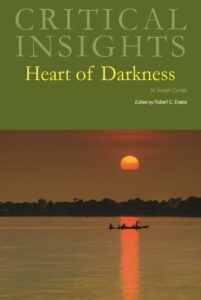 Joseph Conrad masterwork “Heart of Darkness” has not only inspired but has also provoked heated controversy. Once seen as an attack on the brutalities of European colonialism, it can also be read as a colonialist project in its own right. This volume edited by Robert C. Evans explores the many dimensions of Conrad’s work, looking at it in historical, literary, and cultural contexts, and examining both its artistry and its themes. I have contributed an original chapter to this volume, entitled “Ethics and Horror in Heart of Darkness,” which may be of interest to students and scholars working on Conrad, modernism, postcolonialism and ethics. It closely and critically examines ethics and colonial power in this novella.
Joseph Conrad masterwork “Heart of Darkness” has not only inspired but has also provoked heated controversy. Once seen as an attack on the brutalities of European colonialism, it can also be read as a colonialist project in its own right. This volume edited by Robert C. Evans explores the many dimensions of Conrad’s work, looking at it in historical, literary, and cultural contexts, and examining both its artistry and its themes. I have contributed an original chapter to this volume, entitled “Ethics and Horror in Heart of Darkness,” which may be of interest to students and scholars working on Conrad, modernism, postcolonialism and ethics. It closely and critically examines ethics and colonial power in this novella.
“Ethics and Horror in Heart of Darkness” deals with Conrad’s negotiation of ethical encounters within the imperial context of the (unnamed) Congo and highlights his complex ethical perspective on empire, culture, and race. The essay explores this complex geopolitical dynamics, and also traces how far Conrad’s ethical outlook in Heart of Darkness is both many-rooted and profoundly ambivalent; it is at once progressive and retrogressive, commensurable and incommensurable, moved by a universal impulse and yet unable to fully embrace the radical exteriority (that is, humanity in its multiplicity) entailed in Conrad’s exogenous ethics of fellowship and solidarity. Relatedly, this essay probes the issues of horror, truth, and myth in the light of Philippe Lacoue-Labarthe’s discussion of these topics in his article “The Horror of the West” (Lawtoo 2012). It critically engages with the French philosopher’s assessment of horror in Heart of Darkness and extends the debate on this issue and, more generally, on ethics and imperialism, adopting a broader philosophical outlook that pays close attention to the materialist, ideological, political, and geopolitical colonial context.
Reference: Acheraïou, Amar. “Ethics and Horror in Heart of Darkness”. Critical Insights: Heart of Darkness, by Joseph Conrad. Edited by Robert C. Evans. Salem Press, 2019, p.49-72.
